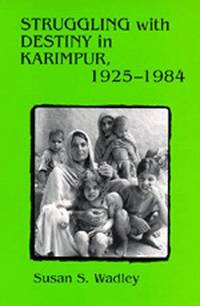
Stock Photo: Cover May Be Different
Struggling With Destiny in Karimpur, 1925–1984 (Paper) Paperback - 1994
by Susan S. Wadley
- New
- Paperback
Description
New
NZ$82.87
NZ$21.06
Shipping to USA
Standard delivery: 14 to 21 days
More Shipping Options
Standard delivery: 14 to 21 days
Ships from Revaluation Books (Devon, United Kingdom)
Details
- Title Struggling With Destiny in Karimpur, 1925–1984 (Paper)
- Author Susan S. Wadley
- Binding Paperback
- Edition Edition Unstated
- Condition New
- Pages 319
- Volumes 1
- Language ENG
- Publisher Univ of California Pr, Berkeley
- Date 1994
- Features Bibliography, Index
- Bookseller's Inventory # x-0520084071
- ISBN 9780520084070 / 0520084071
- Weight 1.01 lbs (0.46 kg)
- Dimensions 8.98 x 5.48 x 0.85 in (22.81 x 13.92 x 2.16 cm)
-
Themes
- Cultural Region: Asian - General
- Library of Congress subjects Ethnology - India - Karimpur, Villages - India - Karimpur
- Library of Congress Catalog Number 93048297
- Dewey Decimal Code 306.095
About Revaluation Books Devon, United Kingdom
Biblio member since 2020
General bookseller of both fiction and non-fiction.
